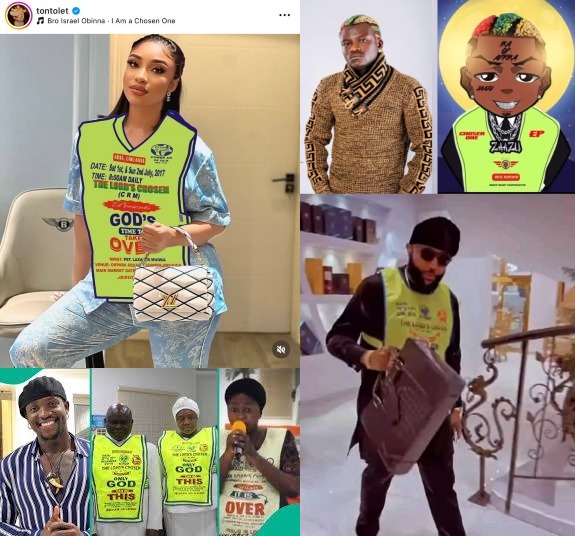Africa
When God’s Message Goes Viral: The Power Behind “I Am a Chosen, Who Are You?”, by Isaac Asabor

In a world where trends rise and fall at the speed of a tweet, one chant has defied the ordinary and resonated beyond expectation: “I am a chosen, who are you?” Initially intended as a mockery of Nigerian Christians, this phrase has not only endured but thrived, reaching viral status, even among celebrities. What began as an attempt to ridicule has instead been adopted by influencers, actors, and musicians, demonstrating a profound truth: whatever is of God always finds a way to go viral.
The chant, associated with members of the Lord’s Chosen Charismatic Revival Ministry, is now proudly echoed across social media platforms. Far from its original mocking intentions, it has become a badge of faith, a declaration of belonging to a higher purpose. From Nollywood stars to musicians, Nigerians from all walks of life have embraced the phrase, flipping the narrative and turning what was meant to be derision into a viral expression of divine identity.
The power behind this chant’s virality is rooted in the timeless nature of God’s word. Messages that originate from a place of truth and light cannot be silenced, no matter the opposition. History is filled with examples of people who mocked or ridiculed Christianity only to see those same symbols or messages rise to prominence.
This phenomenon highlights an eternal principle: anything aligned with God carries a force that transcends human intentions. It reminds us of Joseph’s story in the Bible, where his brothers’ malicious intentions ultimately led to his rise in Egypt. Similarly, those who sought to make light of the Christian faith have inadvertently propelled it into the spotlight.
One of the remarkable aspects of this viral chant is how it has caught the attention of Nigerian celebrities, many of whom have used their platforms to amplify its reach. These influencers, often seen as trendsetters, have embraced “I am a chosen, who are you?” with enthusiasm, further catapulting it into the public consciousness.
For instance, Nollywood actress and politician, Tonto Dikeh, has weighed in on the unarguable mockery surrounding testimonies from members of the Lord’s Chosen Charismatic Revival Ministries. In a show of support, Tonto Dikeh took to her Instagram page to post image of herself wearing the Lord’s Chosen Church vest. Alongside the image, she proudly identified as a member of the church, affirming her faith and defending the testimonies.
In a similar vein, Mr. Emeka Okonkwo, popularly known as E-Money, has joined the the “I’m a chosen, who are you?” fad, and has by that surprised many with this public declaration, considering his previous low-profile approach to religious matters. His involvement has drawn attention, sparking conversations among his fans and followers about this unexpected move. While some see this as a personal spiritual journey, others speculate it might be a strategic move to align with the growing religious community. Whatever the motivation, E-Money’s declaration has further fueled the trend, making it a topic of discussion among Nigerians.
In fact, the often controversial Nigerian musician, Portable, also surprised many when he adopted the chant in one of his viral videos. Known for his eccentric style and unpredictable behavior, Portable’s use of “I am a chosen, who are you?” was unexpected but impactful. While some initially thought he was mocking the chant, Portable has since expressed that he respects the power behind the phrase and recognizes its deeper spiritual significance.
Also, Nigerian singer, Habeeb Okikiola, popularly known as Portable, has announced his upcoming extended play (EP) titled “Chosen One”. Sharing a preview of one of the tracks on his Instagram page, Portable generated excitement among fans, with the teaser artwork inspired by the viral ‘I am a Chosen’ trend. The song features a mix of Yoruba and English, where Portable reflects on his contributions to both Christian and Islamic communities, expressing his belief that his good deeds will secure him a place in heaven.
The announcement has sparked discussions across social media, as Portable boasts of his support for religious institutions, including providing instruments and electricity for churches and mosques. In the song, he narrates his experiences attending various churches and spiritual mountains, underlining his spiritual journey. Portable, who rose to fame in 2021 with his hit single “ZazooZeh” featuring Olamide and Poco Lee, continues to maintain his presence in the music scene with this new project.
The viral spread of “I am a chosen, who are you?” speaks to the power of faith communities in the digital age. The ability of Nigerian Christians to reclaim a phrase meant to mock them shows a resilient faith, one that takes mockery and turns it into an opportunity for testimony. In a time when trends come and go, it is rare to see something rooted in spirituality capture the imagination of not just the faithful but also pop culture icons.
The celebrities who have adopted the chant are unknowingly participating in something much bigger. Whether they view it as a trend or not, by echoing “I am a chosen, who are you?” they are engaging with a divine narrative that transcends pop culture. What was intended for shame has become a rallying cry, a reminder that God’s word always finds a way to prevail. After all, it is biblical that “Whoever will call on the name of the Lord will be saved,” as can be found in Joel 2:32, and Romans 10:13.
Without a doubt, this moment in Nigeria’s cultural zeitgeist stands as a testament to the fact that when something is of God, it cannot be stifled or diminished. Instead, it rises above, becoming a beacon of hope, faith, and, yes, going viral in ways that no one could have anticipated. Whether through the voices of Tonto Dike, E-Money, or Portable, the chant has transformed into a declaration of divine belonging, proving that what is truly of God will always find a way to shine through the noise.



























